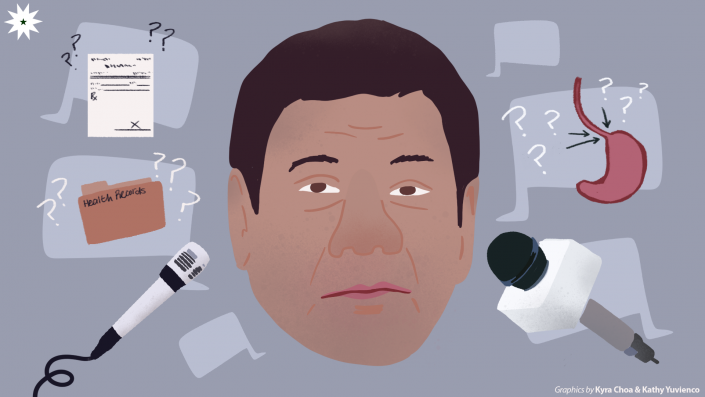An international forum focused on the status of President Rodrigo Duterte’s health was held last May 23 via Facebook Live. Titled Sulong Mandamus, the conference intended to shed light on the public’s constitutional right to know the President’s current medical condition.
The forum was spurred by the mandamus petition filed before the Supreme Court by DLSU alumnus Atty. Dino De Leon (JDCTR, ‘14) last April 13, demanding the disclosure of the President’s health condition, which the petition described as a matter of “paramount interest”. Despite this, both Malacañang and the Supreme Court have rejected the said petition.
The forum was hosted by Now You Know, in partnership with the Malaya Movement, La Salle Debate Society, UNESCO Young Professionals of the Philippines, Vera Files, and Student Council Alliance of the Philippines.
Chairperson of the UNESCO Young Professionals of the Philippines Ar Angcos, Students Rights and Welfare Chairperson for the Student Council Alliance of the Philippines Pablo Joaquin Foronda-Tanglao, and Cornell University’s Alliance for Science fellow Germaine Jalandoni De Ruña led the discussion as legal, medical, and psychology experts shared their opinions on Duterte’s state of health.
State of health
Duterte, who was 71 years old when he took office in 2016, is thus far the oldest person to be elected as president of the Philippines. Along with controversies that continue to persist through his time in office, questions about his health still remain unanswered.
“I was able to read the petition actually and there was a lot of physical diseases or mga illnesses na nabanggit, pero also may mga mental health issues din that were put under the microscope at ako bilang isang citizen ng bansang ito, gusto kong malaman kung fit to lead pa ba ang pangulo,” De Ruña stated.
(As a citizen of this country, I wish to know whether the President is fit to lead the nation.)

Atty. Dan Gatmaytan from the University of the Philippines College of Law emphasized that the public has the right to know the state of the President’s health. Citing the 1987 Philippine Constitution, Gatmaytan mentioned Article VII, Section 12, which mandates that the public be informed of any serious illness that the President may have; and Article III, Section 7, which enshrines the people’s right to information on matters of public concern. However, he noted that the Supreme Court can rule that the Constitution “affords the Executive Branch a lot of discretion in implementing the provision”. In effect, even if the petition were to pass, the Executive Branch may still prevent the public from knowing the true health condition of the President.
Possible ailments being experienced by Duterte were highlighted by Dr. Christine Santisteban, a member of the American Association of Family Physicians. In particular, Santisteban described two diseases that the chief executive is thought to have: Buerger’s disease, which affects blood vessels, and an autoimmune disease called myasthenia gravis, which affects nerves. “The early changes may progress to advanced precancerous changes, and finally to frank esophageal cancer. If left undetected, this cancer can spread and invade surrounding tissues,” she warned.
Aside from the two diseases, the President also made public in 2018 that he has Barrett’s esophagus, a complication of gastroesophageal reflux disease.
AJ Sunglao, a registered psychometrician, and Dr. Paolo Medina, the President of the Alliance for Improving Health Outcomes Inc., both stressed that the President’s physical and psychological health are “essential”.
“Hopefully isa rin ‘tong jumping point na–i-progress natin ‘yung conversation about mental health and diagnosis,” Sunglao pointed out.
Meanwhile, Medina highlighted the importance of a strong health care system led by an efficient government, asserting, “I talk about health and politics with really no difference because at the end of the day, one enables the other.”
Long-term complications
Former DLSU College of Law Dean Atty. Chel Diokno expressed disappointment with abuses in fundamental rights by those in power, adding that chaos arising from the pandemic is being exploited by unscrupulous officials. “Isa talagang basic right is our right to liberty, which has been threatened and continues to be threatened by the series of warrantless arrests of different people from all walks of life,” he explained.
Diokno confirmed, however, that the petition will not prevent the President from “proving his competence” or downplaying the seriousness of his condition even if the mandamus petition is approved by the Supreme Court. “Pwede mangyari ‘yon, kasi ultimately constitutional question ‘yan, at ang purpose ng petition ay para malaman ‘yung condition niya,” he explained.
(That could happen because it is a constitutional question, and the petition’s purpose is to know his condition.)
On the growing role of social media as a platform for clamor, Diokno emphasized, “I think we should still continue to speak the truth of power; [not speaking out] is no substitute for expressing our opinion on matters of public concern, kaya nga sinasabi natin na sa demokrasya tayo.”
(That is why we say we are in a democracy.)
For Foronda-Tanglao, knowing the state of health of government officials is not only a matter of curiosity but also a matter that bears vital repercussions for the nation. “The health of our civil servants, whether mental or physical, greatly affects the decisions made in our government’s institutions,” he argued. “If the Filipino people are to participate properly in our society’s civic activities, they must be able to do so as informed individuals—this includes knowing the health of our leaders.”
